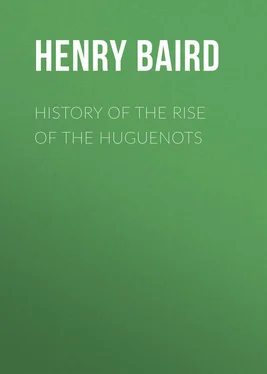Henry Baird - History of the Rise of the Huguenots
Здесь есть возможность читать онлайн «Henry Baird - History of the Rise of the Huguenots» — ознакомительный отрывок электронной книги совершенно бесплатно, а после прочтения отрывка купить полную версию. В некоторых случаях можно слушать аудио, скачать через торрент в формате fb2 и присутствует краткое содержание. ISBN: , Жанр: foreign_antique, foreign_prose, на английском языке. Описание произведения, (предисловие) а так же отзывы посетителей доступны на портале библиотеки ЛибКат.
- Название:History of the Rise of the Huguenots
- Автор:
- Жанр:
- Год:неизвестен
- ISBN:http://www.gutenberg.org/ebooks/30708
- Рейтинг книги:4 / 5. Голосов: 1
-
Избранное:Добавить в избранное
- Отзывы:
-
Ваша оценка:
- 80
- 1
- 2
- 3
- 4
- 5
History of the Rise of the Huguenots: краткое содержание, описание и аннотация
Предлагаем к чтению аннотацию, описание, краткое содержание или предисловие (зависит от того, что написал сам автор книги «History of the Rise of the Huguenots»). Если вы не нашли необходимую информацию о книге — напишите в комментариях, мы постараемся отыскать её.
History of the Rise of the Huguenots — читать онлайн ознакомительный отрывок
Ниже представлен текст книги, разбитый по страницам. Система сохранения места последней прочитанной страницы, позволяет с удобством читать онлайн бесплатно книгу «History of the Rise of the Huguenots», без необходимости каждый раз заново искать на чём Вы остановились. Поставьте закладку, и сможете в любой момент перейти на страницу, на которой закончили чтение.
Интервал:
Закладка:
Lying assurances.
Duke Christopher made the acquaintance of Charles of Lorraine as a preacher on the morning after his arrival, when he heard him, in a sermon on the temptation in the wilderness, demonstrate that no other mediators or intercessors must be sought for but Jesus Christ, who is our only Saviour and the only propitiation for our sins. That day Christopher had a long conversation with Guise respecting the unhappy condition of France, which the latter ascribed in great part to the Huguenot ministers, whose unconciliatory conduct, he said, had rendered abortive the Colloquy of Poissy. Würtemberg corrected him by replying that the very accounts of the colloquy which Guise had sent him showed that the unsuccessful issue was owing to the prelates, who had evidently come determined to prevent any accommodation. He urged that the misfortunes that had befallen France were much rather to be ascribed to the cruel persecutions that had been inflicted on so many guiltless victims. "I cannot refrain from telling you," he added, "that you and your brother are strongly suspected in Germany of having contributed to cause the death, since the decease of Henry the Second – and even before, in his lifetime – of several thousands of persons who have been miserably executed on account of their faith. As a friend, and as a Christian, I must warn you. Beware, beware of innocent blood! Otherwise the punishment of God will fall upon you in this life and in the next." "He answered me," writes Würtemberg, " with great sighs : 'I know that my brother and I are accused of that, and of many other things also. But we are wronged , 31 31 In a letter of Würtemberg to Guise, written subsequently to the massacre of Vassy, he reminds him of the advice he had given him, and of Guise's assurances: "Vous savez aussi avec quelle asseurance vous m'avez respondu que l'on vous faisoit grand tort de ce que l'on vous vouloit imposer estre cause et autheur de la mort de tant de povres chrestiens qui ont espandu leur sang par ci-devant," etc. Mémoires de Guise, 494.
as we shall both of us explain to you before we leave.'"
The cardinal entered more fully than his brother into the doctrinal conference, talking now with Würtemberg, now with his theologian Brentius, and trying to persuade both that he was in perfect accord with them. While pressing his German friends to declare the Zwinglians and the Calvinists heretics – which they carefully avoided doing – and urging them to state the punishment that ought to be inflicted on heretics, there seemed to be no limit to the concessions which Lorraine was willing to make. He adored and invoked only Christ in heaven. He merely venerated the wafer. He acknowledged that his party went too far in calling the mass a sacrifice, and celebrating it for the living and the dead. The mass was not a sacrifice, but a commemoration of the sacrifice offered on the altar of the cross ("non sacrificium, sed memoria sacrificii præstiti in ara crucis"). He believed that the council assembled at Trent would do no good. When the Romish hierarchy, with the Pope at its head, as the pretended vicar of God on earth, was objected to, he replied that that matter could easily be adjusted. As for himself, "in the absence of a red gown, he would willingly wear a black one."
The Guises deceive no one.
He was asked whether, if Beza and his colleagues could be brought to consent to sign the Augsburg confession, he also would sign it. "You have heard it," he replied, "I take God to witness that I believe as I have said, and that by God's grace I shall live and die in these sentiments. I repeat it: I have read the Confession of Augsburg, I have also read Luther, Melanchthon, Brentius, and others; I entirely approve their doctrines, and I might speedily agree with them in all that concerns the ecclesiastical hierarchy. But I am compelled still to dissemble for a time , that I may gain some that are yet weak in the faith." A little later he adverted to Würtemberg's remarks to Guise. "You informed my brother," he said, "that in Germany we are both of us suspected of having contributed to the execution of a large number of innocent Christians during the reigns of Henry and of Francis the Second. Well! I swear to you, in the name of God my Creator, and pledging the salvation of my soul, that I am guilty of the death of no man condemned for religion's sake . Those who were then privy to the deliberations of state can testify in my favor. On the contrary, whenever crimes of a religious character were under discussion, I used to say to King Henry or to King Francis the Second, that they did not belong to my department, that they had to do with the secular power, and I went away." 32 32 There are some characters with whom mendacity has become so essential a part of their nature, that we cease to wonder at any possible extreme of lying. It was, however, no new thing with the cardinal to assume immaculate innocence. Over two years before this time, at the beginning of the reign of Francis II., when bloody persecution was at its height, Sir Nicholas Throkmorton wrote to Queen Elizabeth, Sept. 10, 1559: "I am enformed that they here begin to persecute againe for religion more than ever they did; and that at Paris there are three or four executed for the same, and diverse greate personages threatened shortly to be called to answer for their religion. Wherin the Cardinal of Lorraine having bene spoken unto, within these two daies, hathe said, that it is not his faulte; and that there is no man that more hateth extremités, then he dothe ; and yet it is knowne that it is, notwithstanding, alltogither by his occasion ." Forbes, State Papers, i. 226, 227.
He even added that, although Du Bourg was in orders, he had begged the king to spare him as a learned man. "In like manner," says Würtemberg, "the Duke of Guise with great oaths affirmed that he was innocent of the death of those who had been condemned on account of their faith. 'The attempt,' he added, 'has frequently been made to kill us, both the cardinal and myself, with fire-arms, sword, and poison, and, although the culprits have been arrested, I never meddled with their punishment.'" And when the Duke of Würtemberg again "conjured them not to persecute the poor Christians of France, for God would not leave such a sin unpunished," both the cardinal and the Duke of Guise gave him their right hands, promising on their princely faith, and by the salvation of their souls, that they would neither openly nor secretly persecute the partisans of the "new doctrines!" Such were the barefaced impostures which this "par nobile fratrum" desired Christopher of Würtemberg to publish for their vindication among the Lutherans of Germany. But the liars were not believed. The shrewd Landgrave of Hesse, on receiving Würtemberg's account, even before the news of the massacre of Vassy, came promptly to the conclusion that the whole thing was an attempt at deception. Christopher himself, in the light of later events, added to his manuscript these words: "Alas! It can now be seen how they have kept these promises! Deus sit ultor doli et perjurii, cujus namque res agitur. " 33 33 Bulletin, iv. 196. De Thou's account of the Saverne conference (iii. (liv. xxix.) 127, 128) is pretty accurate so far as it goes, but has a more decidedly polemic tone than the Duke of Würtemberg's memorandum.
Throkmorton's account of the French court.
Meanwhile events of the greatest consequence were occurring at the capital. The very day after the Saverne conference began, Sir Nicholas Throkmorton wrote to Queen Elizabeth an account of "the strange issue" to which affairs had come at the French court since his last despatch, a little over a fortnight before. His letter gives a vivid and accurate view of the important crisis in the first half of February, 1562, which we present very nearly in the words of the ambassador himself. "The Cardinal of Ferrara," says Throkmorton, "has allured to his devotion the King of Navarre, the Constable, Marshal St. André, the Cardinal of Tournon, and others inclined to retain the Romish religion. All these are bent to repress the Protestant religion in France, and to find means either to range [bring over to their side] the Queen of Navarre, the Prince of Condé, the Admiral, and all others who favor that religion, or to expel them from the court, with all the ministers and preachers. The queen mother, fearing this conspiracy might be the means of losing her authority (which is as dear to her as one religion or the other), and mistrusting that the Constable was going about to reduce the management of the whole affair into the King of Navarre's hands, and so into his own, has caused the Constable to retire from the court, as it were in disgrace, and intended to do the like with the Cardinal of Tournon and the Marshal St. André. The King of Navarre being offended with these proceedings, and imputing part of her doings to the advice of the Admiral, the Cardinal Châtillon, and Monsieur D'Andelot, intended to compel those personages to retire also from the court. In these garboils [commotions] the Prince of Condé, being sick at Paris, was requested to repair to the court and stand her [Catharine] in stead. In this time there was great working on both sides to win the house of Guise. So the Queen Mother wrote to them – they being in the skirts of Almain – to come to the court with all speed. The like means were made [use of] by the King of Navarre, the Cardinal of Ferrara and the Constable, to ally them on their part. During these solicitations the Duke D'Aumale arrived at the court from them, who was requested to solicit the speedy repair to the court of the Duke of Guise and the Cardinal of Lorraine.
Читать дальшеИнтервал:
Закладка:
Похожие книги на «History of the Rise of the Huguenots»
Представляем Вашему вниманию похожие книги на «History of the Rise of the Huguenots» списком для выбора. Мы отобрали схожую по названию и смыслу литературу в надежде предоставить читателям больше вариантов отыскать новые, интересные, ещё непрочитанные произведения.
Обсуждение, отзывы о книге «History of the Rise of the Huguenots» и просто собственные мнения читателей. Оставьте ваши комментарии, напишите, что Вы думаете о произведении, его смысле или главных героях. Укажите что конкретно понравилось, а что нет, и почему Вы так считаете.












